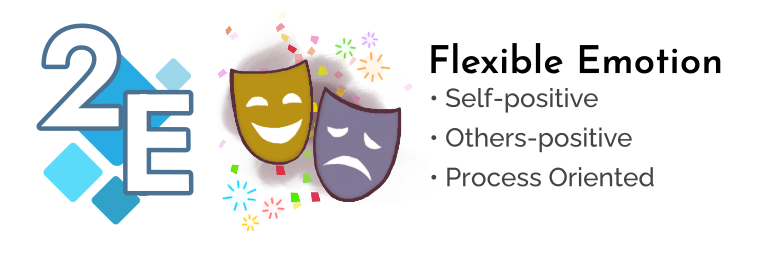
The 2E attitude is characterized by a self-positive (Es+) and others-positive (Eo+) disposition. This disposition creates an attitude that is acutely aware of how emotional information can be transferred between itself and the outside world in both directions. 2Es understand the elasticity, usefulness, and creative element within this aspect and generally feel a sense of fearlessness in discussing or sharing information within this realm. The strategies that each 2E employs may differ in behavior or execution but the core attitude of objective, flexible communication will remain consistent for all 2Es. Below are some common beliefs and behaviors that you may see with 2Es. Please keep in mind that these are generalities and do not represent the vast sub-archetypes held within the overall 2E attitude.
Dichotomies
Certain • Sufficient • Strong • Passive • Objective • Fearless • Wordy • Expansive • Universal
Emotionally Fearless
• Are open and honest about their own emotions while simultaneously helping others to do the same through validation and active listening.
• Can negotiate through any sort of emotional landscape to figure out who feels what in a given situation.
• Tend to believe that disagreements, differences of opinion, and individuality is all to be expected and accepted for what it is.
• Appreciate learning and gathering an array of opinions about what is beautiful, ugly, right, wrong, good or bad.
• Have a hard time creating any sort of value judgment against people for their own emotions, and will instead mitigate this judgment to one of their other attitudes (usually the first or third).
• Believe that everyone has an intuitive nature underneath, and it is their job to journey through their emotions to figure it out – even if it requires outside help.
• Heavily focus on validating all forms of emotion, and encouraging discussion of inner relational opinions, regardless if it is positive or negative.
Active Listening Role
• Will always listen to others’ doubts while offering a stable and reliable arena to express one’s self.
• Can tend to play listener, translator and encourager of emotional displays whenever that role is necessary.
• Consider others’ opinions on emotions and feelings as valid as their own, regardless of the final outcome of a relationship.
• Focus heavily on how their own and others’ feelings evolve, change, or can be changed.
• Are quick to accept other’s moods, and expressed emotions.
• Give off an air of patience with others’ insecurities surrounding relationships.
• Love to share their music tastes, aesthetics and entertainment preferences while hearing what others prefer in return.
• Aim to help people to lower their emotional shields, and accept who they are in an unbounded way.
Blind Spot
• May openly examine and judge the expressions and feelings of those around them which can cause discomfort among those who normally express themselves unhinged.
• Give impressions of intrigue in all emotions regardless of how open they truly are, which can cause people to misjudge them.
•Tend to overlook their own emotional viewpoints as always changing, so can refuse to stick with one opinion for too long.
• May overlook moods or environments that are hindering them due to being too engrossed in the information these environments provide.
• Can appear dramatic, overly honest, and meddling in other people’s personal business regarding their relationships.